(完整word版)begin与start的用法
start和begin的区别用法

start和begin的区别用法Start和begin这两个单词在英语中的意思非常相似,但在某些情况下它们的用法却略有不同。
让我们一起来详细了解一下这两个单词的区别和正确的用法。
1. 意义Start和begin都有“开始”的意思,但有时也可以表示其他的意思。
Start通常表示某个过程或活动的开端,比如启动一台机器、开始跑步等。
Begin则通常用于描述一段时间的开始,比如一天的开始、某个事件的开始等。
2. 用法Start和begin可以作为及物动词或不及物动词使用,具体用法如下:(1)作为及物动词使用Start和begin作为及物动词时,后面接名词或动名词做宾语。
例如:- I started my car and drove away.(我启动了汽车然后开走了。
) - She began playing the guitarwhen she was six years old.(她六岁时就开始弹吉他了。
)(2)作为不及物动词使用Start和begin作为不及物动词时,不需要加任何宾语。
例如:- The concert started at 7 p.m.(音乐会在晚上7点开始。
) - I will begin my workout at the gym in the morning. (明早我会在健身房开始我的锻炼。
)3. 用于时间短语中Start和begin也可以用于时间短语中,但它们的用法有所不同。
Start通常用于指一个事件或活动的开始,通常和某个具体的时间相关联,如:The concert will start at 8 p.m.The meeting started at 9 a.m. sharp.Begin则通常用于指一个时间段的开始,如:The workday begins at 9 a.m.The summer vacation begins in June.4. 与其他词汇的搭配Start和begin在搭配其他词汇时,也有各自的习惯用法。
start & begin 区别以及对应练习

begin和start的区别1. 表示(机器)开始、启动时,start 相当于set going 。
如:How do you start the washing machine? 洗衣机怎么启动?The man can't start the car. 这个人无法发动这辆车。
2. 表示创办、开设时,用start ,不用begin 。
此时的start 相当于set up 或establish 。
如:He started a new shop last year. 去年他新开了一家商店。
3. 表示动身、出发、启程时,用start ,不用begin ,此时的start 相当于set out 或set off 。
如:He started for America last week. 他上周动身去美国了。
4. 表示开始使用时,用start ,不用begin ,此时的start 相当于begin to use 。
如:You have used up this bottle of ink. Will you start another one? 你已用完了这瓶墨水,打算再用一瓶吗?5. 表示惊动、惊起时,用start ,不用begin ,此时的start 相当于be started 。
如:She started at the sound of my voice. 她听到我的声音吓了一跳。
6. 表示提出问题时,用start ,不用begin ,此时的start 相当于raise 或put up 。
如:John started a question at the meeting. 约翰在会上提出了一个问题。
7. 表示怀孕(口语)时,用start ,不用begin ,此时的start 相当于carry 或be in a family way 。
如:Linda has started a baby. 琳达怀孕了。
begin用法例句

begin用法例句关于"begin用法例句"的主题,以下是一篇1500-2000字的文章,逐步回答和解释。
【导言】在英语中,"begin"是一个常见的动词,指示某个行动或活动的开始。
它可以用于不同的情况和语境中,表达各种意思和用途。
本文将详细介绍和探讨"begin"的用法,并提供一些例句进行说明。
【正文】一、"begin"的基本意思与用法1. "begin"的基本意思是指某个行动或活动的开始。
它常用于指示一个新的阶段或某件事情的开端。
例如:- I will begin my presentation with an introduction to the topic. (我会从介绍这个话题开始我的演讲。
)- The movie begins at 7 pm, so make sure you arrive early.(电影在晚上7点开始放映,所以确保你提前到场。
)2. "begin"可以用于表达学习、采取行动或开始进行某个过程。
以下是一些例句:- I want to begin learning a new language this year.(我想今年开始学习一门新的语言。
)- She decided to begin exercising regularly to improve her health. (她决定开始定期锻炼以改善健康状况。
)二、"begin"的不同用法和词组1. "begin with"(以...开始)"begin with"常用来描述一个顺序中的第一个步骤或事物的开始。
例如:- Let's begin with a warm-up exercise before we start the main workout.(在开始主要训练之前,让我们先做一个热身运动。
start的用法总结大全
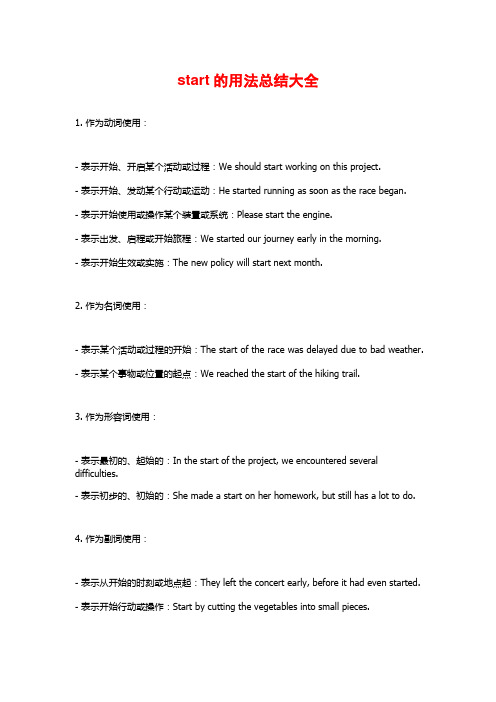
start的用法总结大全1. 作为动词使用:- 表示开始、开启某个活动或过程:We should start working on this project.- 表示开始、发动某个行动或运动:He started running as soon as the race began.- 表示开始使用或操作某个装置或系统:Please start the engine.- 表示出发、启程或开始旅程:We started our journey early in the morning.- 表示开始生效或实施:The new policy will start next month.2. 作为名词使用:- 表示某个活动或过程的开始:The start of the race was delayed due to bad weather. - 表示某个事物或位置的起点:We reached the start of the hiking trail.3. 作为形容词使用:- 表示最初的、起始的:In the start of the project, we encountered several difficulties.- 表示初步的、初始的:She made a start on her homework, but still has a lot to do.4. 作为副词使用:- 表示从开始的时刻或地点起:They left the concert early, before it had even started. - 表示开始行动或操作:Start by cutting the vegetables into small pieces.5. 另外,start还有一些固定搭配和短语用法,例如:- start over:重新开始- start from scratch:从零开始- start a conversation:开始对话- start a fire:点燃火焰- get off to a good/bad start:有一个好/不好的开端- start with:以...开始- startle someone:使某人吃惊需要注意的是,start这个词还有其他一些特定用法和短语,上述总结只是其中的一部分。
begin和start的区别
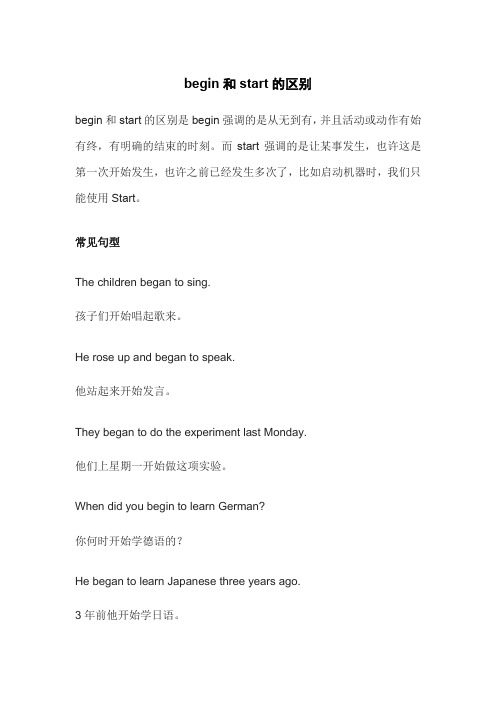
begin和start的区别
begin和start的区别是begin强调的是从无到有,并且活动或动作有始有终,有明确的结束的时刻。
而start强调的是让某事发生,也许这是第一次开始发生,也许之前已经发生多次了,比如启动机器时,我们只能使用Start。
常见句型
The children began to sing.
孩子们开始唱起歌来。
He rose up and began to speak.
他站起来开始发言。
They began to do the experiment last Monday.
他们上星期一开始做这项实验。
When did you begin to learn German?
你何时开始学德语的?
He began to learn Japanese three years ago.
3年前他开始学日语。
词汇搭配
begin school 开始上学begin service 开始服务
begin the meeting 开始开会begin the world 开始谋生
begin translations 开始翻译begin work 开始工作
start off with 从…开始start back for 动身回…去
at the start 当初for a start 首先,第一点
词形变化
begin
第三人称单数:begins 现在分词:beginning 过去式:began 过去分词:begun
start
第三人称单数:starts 现在分词:starting 过去式:started 过去分词:started。
begin和start辨识
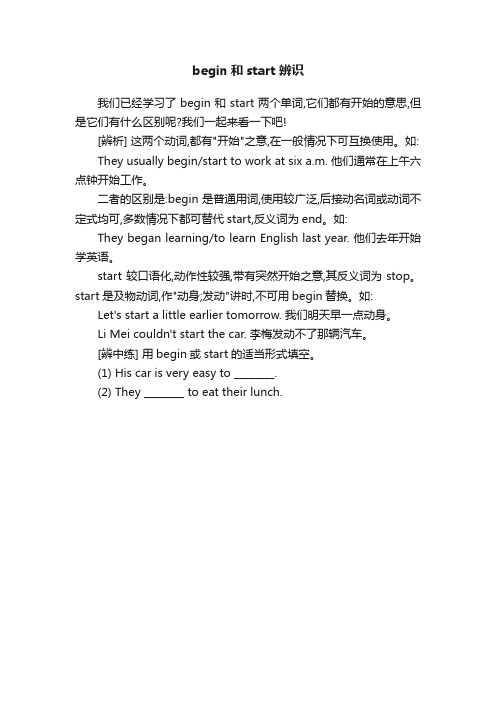
begin和start辨识
我们已经学习了begin和start两个单词,它们都有开始的意思,但是它们有什么区别呢?我们一起来看一下吧!
[辨析] 这两个动词,都有"开始"之意,在一般情况下可互换使用。
如: They usually begin/start to work at six a.m. 他们通常在上午六点钟开始工作。
二者的区别是:begin是普通用词,使用较广泛,后接动名词或动词不定式均可,多数情况下都可替代start,反义词为end。
如:
They began learning/to learn English last year. 他们去年开始学英语。
start较口语化,动作性较强,带有突然开始之意,其反义词为stop。
start是及物动词,作"动身;发动"讲时,不可用begin替换。
如: Let's start a little earlier tomorrow. 我们明天早一点动身。
Li Mei couldn't start the car. 李梅发动不了那辆汽车。
[辨中练] 用begin或start的适当形式填空。
(1) His car is very easy to ________.
(2) They ________ to eat their lunch.。
start动词用法
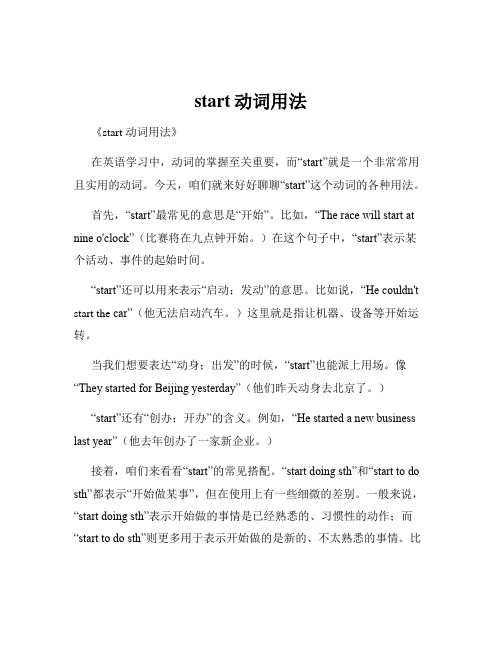
start动词用法《start 动词用法》在英语学习中,动词的掌握至关重要,而“start”就是一个非常常用且实用的动词。
今天,咱们就来好好聊聊“start”这个动词的各种用法。
首先,“start”最常见的意思是“开始”。
比如,“The race will start at nine o'clock”(比赛将在九点钟开始。
)在这个句子中,“start”表示某个活动、事件的起始时间。
“start”还可以用来表示“启动;发动”的意思。
比如说,“He couldn't start the car”(他无法启动汽车。
)这里就是指让机器、设备等开始运转。
当我们想要表达“动身;出发”的时候,“start”也能派上用场。
像“They started for Beijing yesterday”(他们昨天动身去北京了。
)“start”还有“创办;开办”的含义。
例如,“He started a new business last year”(他去年创办了一家新企业。
)接着,咱们来看看“start”的常见搭配。
“start doing sth”和“start to do sth”都表示“开始做某事”,但在使用上有一些细微的差别。
一般来说,“start doing sth”表示开始做的事情是已经熟悉的、习惯性的动作;而“start to do sth”则更多用于表示开始做的是新的、不太熟悉的事情。
比如,“She started crying ”(她开始哭了。
)“He started to learn Englishlast month ”(他上个月开始学英语。
)“start off”也是一个常用的短语,有“出发;动身;开始(旅行、赛跑等)”的意思。
比如说,“They started off early in the morning ”(他们一大早就出发了。
)“start out”则表示“起初是;本来是”。
begin和start有什么区别?这其中的微妙,读好《哈利波特》,不难明白!-白话英语202126
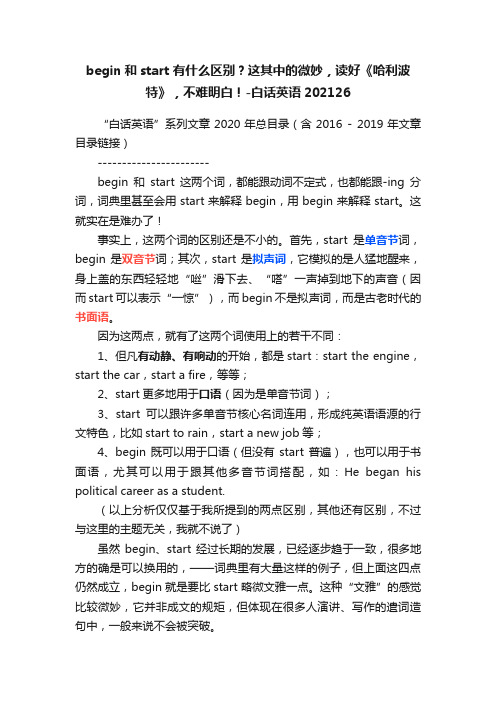
begin和start有什么区别?这其中的微妙,读好《哈利波特》,不难明白!-白话英语202126“白话英语”系列文章2020年总目录(含2016 - 2019年文章目录链接)-----------------------begin和start这两个词,都能跟动词不定式,也都能跟-ing分词,词典里甚至会用start来解释begin,用begin来解释start。
这就实在是难办了!事实上,这两个词的区别还是不小的。
首先,start是单音节词,begin是双音节词;其次,start是拟声词,它模拟的是人猛地醒来,身上盖的东西轻轻地“咝”滑下去、“嗒”一声掉到地下的声音(因而start可以表示“一惊”),而begin不是拟声词,而是古老时代的书面语。
因为这两点,就有了这两个词使用上的若干不同:1、但凡有动静、有响动的开始,都是start:start the engine,start the car,start a fire,等等;2、start更多地用于口语(因为是单音节词);3、start可以跟许多单音节核心名词连用,形成纯英语语源的行文特色,比如start to rain,start a new job等;4、begin既可以用于口语(但没有start普遍),也可以用于书面语,尤其可以用于跟其他多音节词搭配,如:He began his political career as a student.(以上分析仅仅基于我所提到的两点区别,其他还有区别,不过与这里的主题无关,我就不说了)虽然begin、start经过长期的发展,已经逐步趋于一致,很多地方的确是可以换用的,——词典里有大量这样的例子,但上面这四点仍然成立,begin就是要比start略微文雅一点。
这种“文雅”的感觉比较微妙,它并非成文的规矩,但体现在很多人演讲、写作的遣词造句中,一般来说不会被突破。
这两个词,有点像汉语里的“两”和“二”,虽然是同一个东西,但用法还是相当泾渭分明的。
- 1、下载文档前请自行甄别文档内容的完整性,平台不提供额外的编辑、内容补充、找答案等附加服务。
- 2、"仅部分预览"的文档,不可在线预览部分如存在完整性等问题,可反馈申请退款(可完整预览的文档不适用该条件!)。
- 3、如文档侵犯您的权益,请联系客服反馈,我们会尽快为您处理(人工客服工作时间:9:00-18:30)。
1. 意为“开始;发生;发起”时,两者可互换。
如:
Then he began/ started a series of experiment s.然后他就开始做一系列的实验。
How did the accident begin/ start?事故是怎样发生的?
2. 表示开始某一动作时,后面跟不定式或动名词所表达的意思是相同的。
但当表示开始一项较长时间或经常性的活动时,后接动名词的形式则更为常见。
如:
The child began crying/ to cry. 那小孩开始哭了。
3. 两者在下列情况下常接不定式,不接动名词:
( 1 )主语是无生命的事物,而不是人时。
如:
The ice began/ started to melt. 冰开始融化了。
( 2 )当began 和start 用于进行时态时。
如:
The plaster was beginning / starting to fall from the walls. 墙上的灰泥开始脱落了。
( 3 )当begin 和start 后接表示心理状态或精神活动的动词时。
如:
Mary began/ started to guess what is in the bag. 玛丽开始猜包里有什么东西了。
4. 两者都具有及物动词词性和不及物物动词词性。
如:
What time do you begin/ start school?你是什么时候开始上学的?His work starts/ begins at half past eight and finishes at a quarter to five. 他的工作八点半开始,四点四十五分结束。
5. begin/ start with 意为“从……开始”。
如:
Which lesson shall I begin / start with?我应从哪一课开始?
6. begin 和start 均为终止性动词,因此不能与段时间状语连用。
如:电影开始10 分钟了。
误:The film has begun/ started for ten minutes.
正:The film began ten minutes ago.
正:The film has been on for ten minutes.
正:It's ten minutes since the film began.
二. 不同之处
1. 表示(机器)开始、启动时,用start ,不用begin ,时此的start 相当于set going .如:
How do you start the washing machine?洗衣机怎么启动?
The man can't start the car. 这个人无法发动这辆车。
2. 表示创办、开设时,用start ,不用begin .此时的start 相当于set up 或establish .如:
He started a new shop last year. 去年他新开了一家商店。
3. 表示动身、出发、启程时,用start ,不用begin ,此时的start 相当于set out 或set off .如:
He started for America last week. 他上周动身去美国了。
4. 表示开始使用时,用start ,不用begin ,此时的start 相当于begin to use .如:
You have used up this bottle of ink. Will you start another one?你
已用完了这瓶墨水,打算再用一瓶吗?
5. 表示惊动、惊起时,用start ,不用begin ,此时的start 相当于be started .如:
She started at the sound of my voice. 她听到我的声音吓了一跳。
6. 表示提出问题时,用start ,不用begin ,此时的start 相当于raise 或put up .如:
John started a question at the meeting. 约翰在会上提出了一个问题。
7. 表示怀孕(口语)时,用start ,不用begin ,此时的start 相当于carry 或be in a family way .如:
Linda has started a baby. 琳达怀孕了。
8. 指一段时间的开始常用begin ,而不用start .如:
The new school year will begin soon. 新学年很快就要开始了。
另外,begin 表示的开始往往指从起点开始,而start 则不一定。
因此当一件事中断后再开始时应用start again ,而begin again 则含有“从头再来”(= begin afresh )的意思。
如:
Conversation started and stopped ,and after a long pause ,started again. 谈话开始后又停止了,过了好长一会儿才又开始。
Don't lose heart;let's begin again (afresh ). 别灰心,让我们从头再来。
begin / start to do sth
begin / start doing sth.
1) 谈及一项长期活动或开始一种习惯时,使用doing.
How old were you when you first started playing the piano?
你几岁时开始弹钢琴?
2) begin, start用进行时时,后面动词用不定式to do
I was beginning to get angry。
我开始生起气来。
3) 在attempt, intend, begin, start 后接know, understand, realize这类动词时,常用不定式to do。
I begin to understand the truth。
我开始明白真相。
4) 物作主语时
It began to melt。
